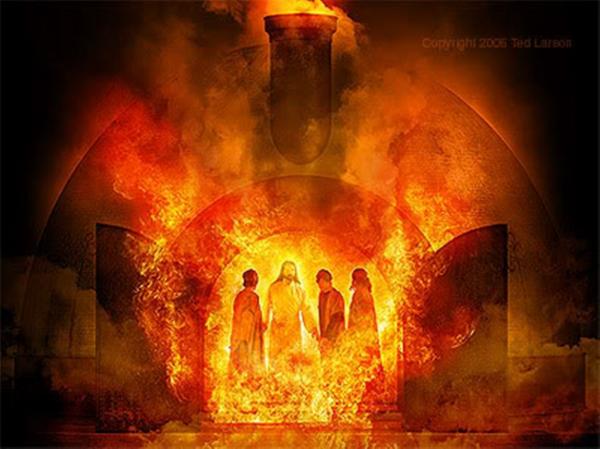 There are multiple instances, images, and interpretations of fire in the Bible. In the Old Testament we read of judgment (Sodom, Genesis 19:24) to acceptance (Elijah’s sacrifice, I Kings 18:38) to instruction (Moses and the burning bush, Exodus 3:4) to encouragement (Jesus in the fiery furnace with the three Hebrews, Daniel 3:92). And in the New Testament we read of refinement (in suffering, I Peter 1:7) to consumption (our acceptable sacrifice, Hebrews 12:28-9) to empowerment (Pentecost, Acts 2:3-4) to eternal suffering (Hell, Mark 9:43).
There are multiple instances, images, and interpretations of fire in the Bible. In the Old Testament we read of judgment (Sodom, Genesis 19:24) to acceptance (Elijah’s sacrifice, I Kings 18:38) to instruction (Moses and the burning bush, Exodus 3:4) to encouragement (Jesus in the fiery furnace with the three Hebrews, Daniel 3:92). And in the New Testament we read of refinement (in suffering, I Peter 1:7) to consumption (our acceptable sacrifice, Hebrews 12:28-9) to empowerment (Pentecost, Acts 2:3-4) to eternal suffering (Hell, Mark 9:43).
The Catholic doctrine of purgatory, final purification of the elect, embodies all these fiery images (except Hell, from which we are saved, Halleluia!). While in the state of purgation,
Our works are judged by fire,
Our sacrifices are accepted by fire,
Our knowledge gains God’s instruction by fire, and
Jesus encourages us with His loving eyes that burn like fire.
There’s suffering involved as we look at Our Lord and are purified of final chaff (I Corinthians 3:11-15) but He wipes all tears from our eyes and brings us to the Father’s House. We need not fear the fire of purgatory, for it is a good thing “to die in God’s grace and friendship (CCC1030).”
When my husband and I were studying Catholicism and checked the catechism regarding purgatory, we were surprised to see just three paragraphs (1030-1032). It didn’t take us very long to look up the footnoted Scriptures and documents. There are excellent explanations of the Biblical proof for final purgation here and here. My husband recently illustrated it like this to our children:
 “It’s like an arctic entry where we shed our wet or muddy or snowy or poopy (We have a hobby farm) garments before entering Mom’s clean house (He’s really nice.). You’re supposed to be there; it’s your house and family; but nothing unclean shall enter therein (He often slips into KJV-talk.).”
“It’s like an arctic entry where we shed our wet or muddy or snowy or poopy (We have a hobby farm) garments before entering Mom’s clean house (He’s really nice.). You’re supposed to be there; it’s your house and family; but nothing unclean shall enter therein (He often slips into KJV-talk.).”
So even if the fire hurts, we can be assured that it is for our good and for the good of all His holy Church. May we recognize God’s voice in the burning bush, His refining in our suffering fires, and His love in His flaming eyes. May we embrace the fire of the Holy Spirit and go forth in confidence, proclaiming the mighty things He has done and praying for those most in need of His mercy. May we someday fall down before His glowing throne to chant, “Holy, holy, holy, Lord God Almighty; heaven and earth are full of Your glory. Hosanna in the highest!”
Saint Joseph, patron of a holy death, pray for us.
Mary, mother of our Lord, pray for us sinners now and at the hour of our death.
Jesus, defeater of death and lover of souls, stay close to us like the Hebrews in the fiery furnace, and lead us Home.

